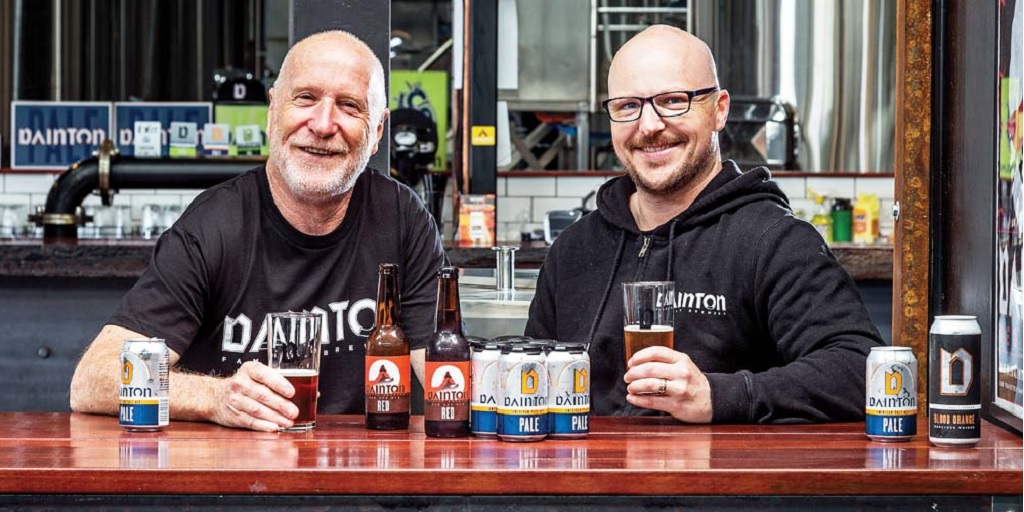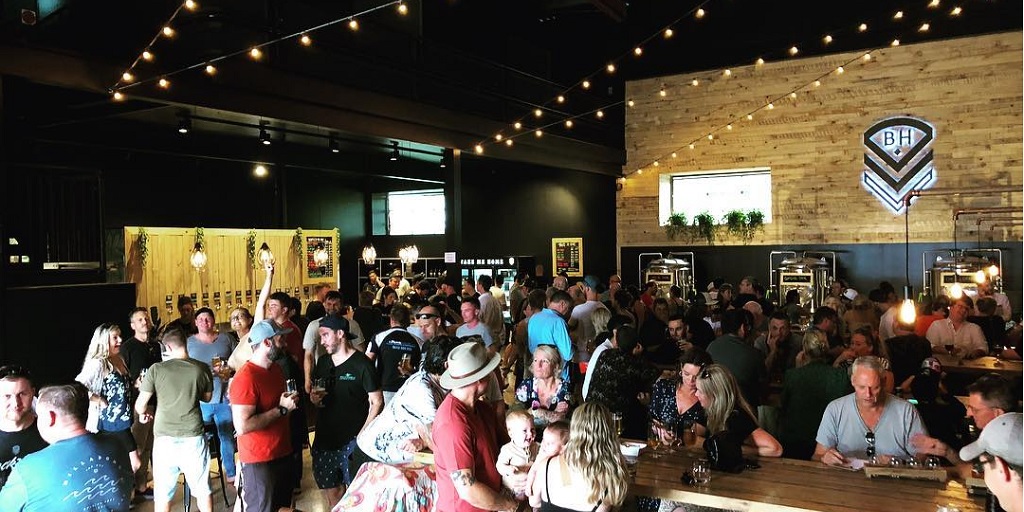
One Year On…equity crowdfunding

It’s been over a year since a raft of breweries made their debut with equity crowdfunding, among them Melbourne’s Dainton Beer and Black Hops on the Gold Coast.
They were the some of the first in the brewing industry to dip their toes in the water with the funding method after it was made available following changes by the Australian government.
Since the changes, industry has seen a host of other breweries launch their own campaigns, including Holgate Brewhouse, which raised more than $700,000 last year as well as Sydney-based Endeavour, which raised more than $500,000 in its campaign last year.
We caught up with Dainton and Black Hops to discuss how their campaigns went, what they’ve done with their funds and what they’ve learnt from their experiences which may help other brewers when they are back in a better position to think about long term funding.
Dainton Brewery crowdfund
In March 2019 Dainton Brewery launched its first equity crowdfund. It was initially planning on targeting around $500,000 with plans to invest in a barrel-ageing and sour beer programme, as well as a bottling line.
It offered investments from $100 to $10,000 for retail investors in exchange for ordinary shares in the company, as well as priority access to limited release beers as a reward.
Co-founder Dan Dainton told Brews News that the crowdfunding was a success, but the money wasn’t the sole objective.
“The crowdfunding was very successful, it really went off with a bang and within 40 hours we’d reached the minimum target.
“We ended up with $250,000, and that’s what the data was telling us, we could have gone for a bit more.
“A big part of crowdfunding was that yes we wanted some money, but we also wanted to get people involved and excited and be a part of it.
“There’s a big value for us and for the investors to be part of something. For myself and my dad as the owners, if we can grow our pie but have a smaller piece, then that’s great.”
At the time it was suggested that the brewery might be able to use the funds to invest in a second venue.
“Our original plan was to look at another venue, within 30-40 mins from our first site,” Dainton explained.
“We looked and we looked and we looked and we looked. The more we looked the more we thought wow, there are a lot of laws and regulations which are against us doing anything like that. You can make wine, but making beer is challenging because of the zoning down here.
“The key for us was having run this business with a taphouse for a while. If we had a second venue it would have to be a sizable hospitality venture and there’s just nothing large enough down that way, which would be a big enough more acreage. It didn’t make sense logically.”
So the business adapted to what made more sense for it, which may have been a blessing in disguise given the current climate for taprooms and venues.
Dainton said that the brewery had seen its biggest growth potential in packaged goods, which is why they’ve invested in a bottling line and a barrel-aging programme, and also undertook some renovations.
“We’ve upgraded the brewery and refurbished the taphouse here, put in a beer garden, used it for working capital and vehicles. It went well except we didn’t decide to go with a second venue, but I think people have forgiven us for it,” he said.
But while the past year has been one of strong growth for the brand, it too has felt the effects of the COVID-19 pandemic.
“We and our investors are lucky that we were able to keep a small part of the business open. It’s been awful for our hospitality staff and we hope to get them back. Right now we’re all working 1.5-2 jobs. That’s tough but we’ve got jobs so that’s something.
“We’ve also come up with some creative solutions. For example we’ve had to shut the bar, and we had a bunch of kegs, seven 50-litre kegs of one and 20 of another and we can’t package seven kegs so we thought we’d blend a few and see what we can come up with. “
This resulted in Dainton’s Pandemic Punch, a 6.6% abv blend of Neipa and fruit beers, and Ryesolation, a mix of Rye Ale and Rye Porter releases.
Dainton is looking at the COVID-19 pandemic as an opportunity to look at other areas of the business, having recently brought distribution in house.
“For us it’s about how we can start to work in some efficiencies in our freight, brewery, buying power, and how can we become a better business to get more beer out to people?
“That’s what we’ve got from taking our own distribution back, as some people haven’t had easy access to it. Having the ability to do that state by state, it’s less exciting stuff but having more accessibility and awareness is good. I’m all for people drinking local, and good quality and consistent stuff.
“That’s important to me. I don’t want to waste my time with a shit locally produced beer. It helps develop a little bit of brand loyalty and trust. That’s what we want to work on for ourselves.”
This is where crowdfunding fits in for Dainton Brewery, as it strives for greater quality and consistency in its beers. But Dan said that once COVID-19 was a distant memory, crowdfunding might be something other breweries take up.
“It obviously depends where they’re at, are they a startup or established?
“If you’re in a position where you’ve got enough people, the reality is that you might have 500 people invested in your company and they will be your new boss to a point, and you need to have a means of being able to deal with that.
“We knew that would be the case, but it takes a little bit of management too. There’s a lot of work in it.”
On the flipside, he also advised caution, and to enter into it with eyes wide open.
“If it doesn’t work, that might damage your brand a little bit too. If someone smaller does it, and wants to get $500,000 and everyone says no, that might not be so helpful.
“Also why would you not look at other types of investment? What are you doing it for, would you be better off looking at venture capital funding?
“The thing about crowdfunding is that if you’re an astute investor, looking at how the business value is calculated, larger investors might not think that’s how they would value it, you really have to understand your other options before you jump into it.
“We were third or fourth cab off the rank and for us it was good, the guys at Birchal were great and super professional. Vitale is a superstar and he is worth his weight in gold.
“The other thing to consider too is you want to give you staff shares, directors who don’t have shares and you want to give them some, but if you’re a brewery and want to get funded for a project, it’s a friendly way to do it, especially if you’ve got a lot of support already.
“I would definitely consider it, if it’s right for you, and I’m happy to speak to anyone who wants a chat about it,” he offered.
Black Hops
Gold Coast brewery Black Hops also completed an equity crowdfunding round at the beginning of 2019, also on the Birchal platform.
The team, consisting of Dan Norris, Eddie Oldfield and Michael McGovern, were no strangers to the concept of crowdfunding, having launched their first rewards-based campaign in early 2015 to help complete their brewery and taproom build in Burleigh Heads.
This time round they wanted to fund Black Hops II, a second site which they had started planning in 2018. A target of $400,000 was given to this campaign, and Norris put its completion down to the crowdfunding.
“Absolutely [we got everything done that we wanted]. We raised money to get our second brewery completed in January 2019 and we launched in March 2019.
“It was very much like our very first crowdfunding campaign when we raised $18,000 to open the original brewery and it came at a time when we really needed the money, and the people who invested are still friends to this day.
“We also fulfilled all the awards and have done heaps of other things that weren’t originally promised like monthly exclusive Alpha Team beer launches, an Alpha Team exclusive brew day and beer launch etc. It’s been awesome.”

The opening of Black Hops II
Life with extra investors is nothing new to Black Hops, but this was another step forward, but Norris says it has been a great experience.
“All of our investors from the early traditional investors to the very last equity crowdfunding investors have been really great,” he said.
“We know we are a business that is owned in a big part by our customers and that’s how we like it.
“Most of the people who invested in our crowdfunding campaign are taproom regulars who we all know personally and we are stoked we can bring them along the ride with us.
“We always had a really tight relationship with our customers and backers from the early days and that has just gone to a new level now.”
Black Hops is planning a crowdfund in the near future, but Norris explained that initial plans were for a project that “wouldn’t make sense at the moment.”
“I’m still keen to do it. I just want to see how the next few months go before deciding. I’m thinking maybe towards the end of the year.
“I’d love to do it again for sure. I’d love to do it every year if it makes sense for the business and people still want to invest.
“We are constantly getting contacted by people who want to invest and I’d much rather give up equity to our customers, than to institutional investors which so far we have avoided.”



